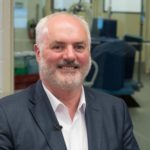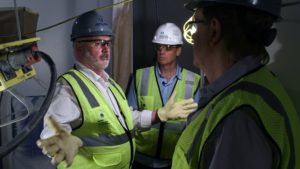International thought leader Frank Barry to give keynote talk at Zoobiquity Colorado
Not everyone can identify an exact point in time that shaped the rest of their career. Dr. David Frisbie can.
Frisbie, professor of equine surgery and director of the C. Wayne McIlwraith Translational Medicine Institute at Colorado State University, credits a study of goats that received stem cell therapy for inspiring the use of similar treatments for horses at CSU, and ultimately leading to the creation of the institute.
In 2003, Frisbie came across a study published by Frank Barry, now a world-renowned researcher and a senior scientist with the Arthritis Program, University Health Network in Toronto.

Barry’s research showed that following an injection of stem cells a small number of goats regenerated their injured meniscus, thin fibrous cartilage between parts of the knee joint. According to the study, in addition to distinct regeneration of the meniscus, implanted cells were detected in the newly formed tissue.
The use of stem cells “shut down the arthritic pathway” in these goats, explained Frisbie. “We have such a problem in equine medicine with meniscal injuries. And in humans, the meniscus can’t be regenerated.”
Inspired a program at CSU
The promise of a solution to that problem offered by Barry’s research led to the start of the stem cell program at CSU.
At the Orthopaedic Research Center, stem cells are used with surgery and rehabilitation to regenerate and repair diseased or damaged tissue in horses, similar to the way that these cells are used for humans with osteoarthritis and other conditions.
“Professor Barry is the person who inspired us to start the program,” said Frisbie in a joint interview with Barry, who visited the CSU campus recently.
Turning to Barry, who has collaborated for years with Drs. Frisbie and Wayne McIlwraith, Frisbie asked, “Did you ever think that original paper on goats would spur on different research groups and end up in us building the Translational Medicine Institute?”
“No,” Barry said.””But it’s fantastic to hear other scientists were inspired by the work we did back then. We understood its significance but didn’t anticipate it would have the impact it would.”
Zoobiquity Colorado connects all species
 Frank Barry is a keynote speaker at Zoobiquity Colorado: Connecting Human and Animal Health through Regenerative Medicine. The conference, which will be held Oct. 5-6, aims to uncover the connection between human and animal health by highlighting laboratory and clinical research of human and veterinary investigators and fostering collaboration across disciplines.
Frank Barry is a keynote speaker at Zoobiquity Colorado: Connecting Human and Animal Health through Regenerative Medicine. The conference, which will be held Oct. 5-6, aims to uncover the connection between human and animal health by highlighting laboratory and clinical research of human and veterinary investigators and fostering collaboration across disciplines.
“Animal health and human health are on parallel and convergent paths,” said Barry. “Many of the problems that appear in veterinary medicine appear in human medicine. That applies very much in this area of stem cell therapy, and it is equally applicable to animal health and human health.”
Learn more about the conference and register: https://zoobiquity.colostate.edu/
Registration is $350 for professionals, and $75 for students, residents and post-doctoral fellows.
Zoobiquity Colorado is sponsored by the College of Veterinary Medicine and Biomedical Sciences at CSU and the Gates Center for Regenerative Medicine at the University of Colorado.
Translational Medicine Institute to build on stem cell, other therapies
The institute, set to open in November 2018, will draw on established areas of CSU research expertise in orthopaedics, biomedical engineering, immunology, infectious disease, surgical advances, and other medical fields.

Barry, who is also a professor of cellular therapy at the National University of Ireland Galway, said his original paper has led to continued research on the use of cellular therapies for treating arthritis in humans. His team subsequently conducted a study with a larger number of goats, which really responded to the stem cell treatment.
“We became convinced that the repair response was valuable,” Barry said. “That started this path that we are still on,” referring to his current work on the development of new repair strategies for arthritis in stem cell therapy and gene therapy in orthopaedics.
‘Phenomenal results’ observed in horses
Frisbie said that he saw remarkable results using stem cell therapies to treat horses, right out of the gate. He recalled working with a client whose horse had been lame for six months due to an injury with its stifle, which is similar to a knee joint in humans.
“Ninety days after the stem cell injection, the horse was healthy,” said Frisbie. This continued for two years, “which was pretty phenomenal, given that it had suffered one of the worst injuries I’ve ever seen.”
Seeing that success really fueled his interest in this type of therapy. Since that procedure, Fribie has talked with other clinicians about this case. “Every surgeon I’ve shown the still images to would say, ‘that horse would never come back’” from the injury.
McIlwraith, a University Distinguished Professor and founding director of the Orthopaedic Research Center, described Barry’s 2003 study as “spectacular.”
“It’s changed how we’ve handled injuries,” he said, describing how the team at CSU successfully treated horses with stem cells after conventional therapies for meniscal and cartilage injuries had failed.
Barry said stem cell therapy is a good example of where animal medicine and human medicine run parallel paths. Teaming up with CSU over the years has provided an opportunity for his team to see the results from large-animal studies. In return, Frisbie, McIlwraith and CSU veterinarians have benefitted from Barry’s discoveries in human clinical studies.
About the Translational Medicine Institute
The Translational Medicine Institute is uniquely positioned for discoveries in translational medicine, as biologic therapies – which leverage the body’s own healing powers – present a new therapeutic frontier. The institute will draw on established areas of CSU research expertise in orthopaedics, biomedical engineering, immunology, infectious disease, surgical advances, and other medical fields.